Refugee co-sponsors
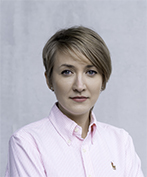 Tina Dixson
Tina Dixson
Focus area: Protection capacity
Tina Dixson is a feminist academic and a policy professional, who has worked in the areas of LGBTIQ, refugee and women’s rights. Her focus is Australia and she has also worked overseas. Tina has engaged with human rights bodies such as CEDAW (Convention on the Elimination of all Forms of Discrimination against Women). She also helped develop the Global Compact on Refugees, focusing on inclusion and mainstreaming of age, gender and diversity sensitive approaches.
Tina is a PhD candidate at the Australian National University researching the experiences of LGBTIQ asylum-seeking and refugee women in Australia. She is a co-founder of the Queer Sisterhood Project, a refugee-led support and advocacy group for LGBTIQ asylum-seeking and refugee women. She is also a co-convener of the first Australian conference on the issues of LGBTIQ asylum called Queer Displacements: Sexuality, Migration and Exile.
Tina is Policy Officer at the Australian Women Against Violence Alliance, one of six national women’s alliances to bring together women’s organizations and individuals across Australia to share information, identify issues and contribute to solutions in responding to and preventing violence against all women and their children. Tina sought asylum in Australia in 2012 as a queer human rights activist. As such, protection means a great deal to her.
“Protection means being able to call this new place your home. As a queer person, … you have always been reminded that your life is not valid and it is better if you didn’t exist. Being protected and being safe means finally getting that feeling and that place,” she said.
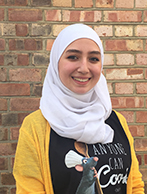 Maya Ghazal
Maya Ghazal
Focus area: Education
UNHCR High Profile Supporter Maya Ghazal fled Damascus in 2015 leaving behind her home, her plans and dreams. Maya has become a prominent advocate for refugee rights and has attended and spoken at numerous global events including World Refugee Day at the Palace of Westminster in London, several education panels at Le Palais Des Nations in Geneva, corporate events in Amsterdam and in many media interviews and through social media.
In 2018 Maya gave a powerfully inspiring speech at TEDxPalaisDesNationsWomen in which she smashed stereotypes and offered five solutions to better understanding refugees and why we should invest in their limitless potential.
With determination, hope and resilience Maya has started a new life in the UK and is currently studying Aviation Engineering at Brunel University with the aspiration of becoming the first female Syrian refugee pilot.
“Education is so important for refugees if they are going to achieve their dreams,” she said.
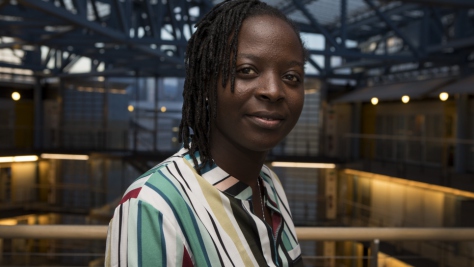 Joelle Hangi
Joelle Hangi
Focus area: Energy and infrastructure
Joelle Hangi is a refugee in Kenya from the Democratic Republic of the Congo.
Studying in Kakuma Camp, which is home to some 185,000 refugees in the remote desert northwest of Kenya, she is keenly aware of the value of sustainable energy and good infrastructure.
“The few learning centres that we have are powered by solar – which is really helpful - but we need some back up. If it’s raining, you don’t have access to internet,” she says.
As well as keeping schools lit and online, improving energy storage capacity would ensure that families have reliable sources of lighting into the evening, she says, allowing children to study at home.
Joelle is pursuing her Bachelor degree in Business Communication with Southern New Hampshire University. She has participated in research projects with Oxford University and the University of Geneva to identify the different challenges associated with living in a refugee camp – among them infrastructure.
The camp relies to a great extent on food and other goods brought in from outside, often over long distances.
Improving roads would provide an economic boost to refugees, she asserts.
“Economically it’s something that affects us … We have to rely on the nearest city – which it is 450 kilometres away – and prices are double or even five times higher here, because of the condition of the roads,” she says. “Just a single apple, down. country is one dollar, but in Kakuma, it is five dollars.”
Joelle wants to influence policies, to empower, and to support the dignity of the displaced. She hopes that actions and good practices coming out of the forum will enable refugees to the best they can.
“We just need to be able to support ourselves and continue with our lives,” she says. “We understand that this humanitarian world can’t last for ever.”
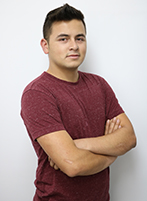 Diego Narváez
Diego Narváez
Focus area: Jobs & Livelihoods
Diego Narváez fled Colombia with his family at a young age and started a new life in Ecuador.
That experience of displacement has motivated him to try and change the narrative about refugees and bring their voices to a wider audience. He has worked with international organizations including RET International, Fundación de las Américas (FUDELA) and UNHCR to address issues faced by refugee populations in the Americas, particularly refugee youth and help advance their human rights. Diego was part of a social campaign entitled, “Lo que nos une” (What Unites Us), which aimed to dismantle stereotypes about refugees and migrants and promote social cohesion between refugees and host communities.
In addition, Diego represented refugee youth from Ecuador at the Global Refugee Youth Consultations – which were conducted by the Women’s Refugee Commission and the UNHCR between 2015 and 2016 – and contributed to the Core Actions for Refugee Youth, an integrated framework that provides a blueprint for addressing challenges faced by refugee youth.
Diego is currently studying International Relations at the University of San Francisco in Quito with the aim of joining the United Nations and continuing his advocacy for the rights and well-being of refugees in Ecuador and across the world.
He says it is fundamental for refugees to be able to find work:
“I always see people coming to Ecuador as refugees and see all the problems that they face. The first thing you are looking for when you escape from a conflict is to survive (financially) and for that you need money. Skills will help you get a job more easily and good skills will help get a good job,” he said.
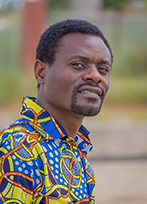 Trésor Nzengu Mpauni
Trésor Nzengu Mpauni
Focus area: Burden and responsibility sharing
Trésor Nzengu Mpauni, also known as ‘Menes la Plume’, is a multilingual slam poet, Hip-Hop artist and writer born in Lubumbashi, in the Democratic Republic of Congo (DRC). In 2008, Trésor was forced to leave his home and now lives in the Dzaleka Refugee Camp in Malawi.
In 2012, Trésor founded Tumaini Letu (Swahili for “Our Hope”), a nonprofit organization based in the Dzaleka Refugee Camp, which promotes cultural exchange between refugees and the host communities. One of the organization’s major programs is the annual “Tumaini Festival”, which transforms the Dzaleka Refugee Camp into an international festival ground. The Festival draws thousands of people to the Camp to celebrate intercultural harmony, mutual understanding and peaceful co-existence through musical and cultural performances.
Trésor also maintains an active stage presence as a poet and musician, touring nationally and internationally. As a motivational speaker, and advocate for refugee rights and peace in Africa, Trésor continues to spread his message in schools, universities, outreach programs and with the broader public through events such as TEDx Lilongwe. His main mission is to use the power of words, music and culture to raise awareness about issues surrounding refugees, and to promote unity.
Trésor is the recipient of local and international awards including the World Bank Africa Region’s Social Inclusion Hero 2018 Award.
 Felix Sesay
Felix Sesay
Focus area: Education
Felix Sesay is a refugee in Ghana from Sierra Leone. He studies at St. Karols School of Nursing in Accra on a DAFI scholarship (the Albert Einstein German Academic Refugee Initiative).
As a refugee in Ghana, Felix faced poverty and hardship as he pushed to get an education. He is now a passionate advocate for the rights and well-being of refugees, including their access to education.
“Education to me is very important because of my experience, my struggle, to go through secondary education on my own. For many refugees it is very hard ... Most drop out of school because they lack the basics and it makes them uncompetitive in terms of academic excellence and scholarship opportunities," he said.
As a student nurse, Felix has conducted several health screenings among residents of Krisan Refugee Camp in Ghana and led workshops on gender-based violence. In addition, he regularly holds awareness-raising sessions on education for refugee youth and provides them with capacity-building support for exam preparation and scholarship applications.
In June 2019, Felix represented tertiary refugee students at a major international conference entitled, “The other 1%” in Berlin, advocating for increased access to and quality of education for refugees. Felix will obtain his degree in 2020 and aims to continue his advocacy work.
.
 Hina Shikhani
Hina Shikhani
Focus area: Solutions
Hina Shikhani is an Afghan refugee born in Pakistan. She is a student of Business Administration at the University of Peshawar on the DAFI scholarship programme (the Albert Einstein German Academic Refugee Initiative).
As a young refugee, Hina has faced a range of challenges that have led her to become a passionate advocate for solutions that enable refugees to live in dignity and peace, including refugees’ access to higher education and self-reliance.
“For me, ‘solutions’ means a durable solution for refugees,” she said.
Notably, Hina is a champion of girl’s education and empowerment.
Currently, she is working as a researcher on a project entitled, “Voices of refugee youth,” holding focus group discussions with female Afghan students in Pakistan. In her free time, Hina is involved in blood donation campaigns and awareness raising sessions with “Blood Donor Society”.
But her ultimate goal is to return to Afghanistan one day and make a difference.
“When I’m equipped with skills and knowledge I want to go back to my country and help young women and youth stand up for themselves,” she said.
